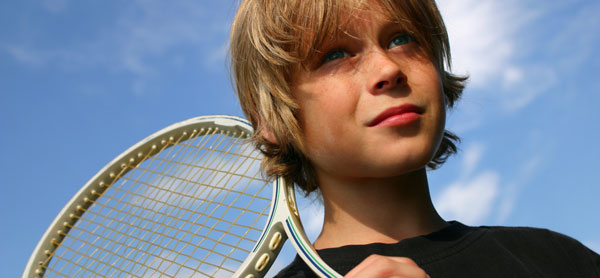Tennis can be played as both a sport or as a
recreational activity with friends and family. Either way, playing
tennis is a good sport to maintain your health, fitness, strength and
agility.

It has been calculated that a good hour-long game of singles tennis burns around 600 calories for men and 420 calories for women. In addition to the fitness and physical health benefits, tennis also provides numerous social and mental health benefits as well.
Health benefits
Tennis can be a great workout and lots of fun. Tennis has many health benefits including:
- Increasing aerobic capacities
- Lowering resting heart rate and blood pressure
- Improving metabolic function
- Increasing bone density
- Lowering body fat
- Improving muscle tone, strength and flexibility
- Increasing reaction times.
Other benefits
As well as being a great physical workout, tennis is also:
- A non-impact sport
- A great way to meet people and spend time with friends
- Suitable for all ages and skill levels. Whatever your level, you can find someone with a similar ability to play with
- Helpful to reduce stress
- Not dependent on youth or strength – you can play for a lifetime or start the game at any age.
Getting started
In order to play tennis you need a racquet, a ball, a court with a net, and an opponent. Physically, tennis is great for hand-eye coordination, development, and movement. It’s definitely not a game you play standing still. Children can benefit socially, since most lessons for children are in groups. And one thing that’s really important to remember is that tennis is an individual sport, so children learn to be accountable to themselves. It’s a skill they can take into all areas of life.
At what age should children start playing tennis?
It’s a very relative question. Children are not
being ready for tennis before 4 years old, and very few at 4 years
old. With younger children, you work on coordination games, movement
games, and teaching them building blocks of playing the sport. But it
depends on the child and some are ready at a younger age.
What should the goal of tennis lessons be for young children?
Main goal is to have children play tennis for the
rest of their lives. Tennis can be a recreational activity. They can
play for a high school team or a serious tournament team.
Tennis helps to:
- develop a work ethic because improvement through lessons or practice reinforces the value of hard work.
- develop discipline since you learn to work on your skills in practice and control the pace of play in competition.
- manage mistakes by learning to play within your abilities, and realizing that managing and minimizing mistakes in tennis or life is critical.
- learn to compete one-on-one because the ability to do battle on court trains you in the ups and downs of a competitive world.
- accept responsibility by practicing skills and checking your equipment before a match, and by making accurate line calls during a match.
- manage adversity by learning to adjust to the elements (e.g. wind, sun) and still be able to compete tenaciously.
- control stress effectively because the physical, mental and emotional stress of tennis will force you to increase your capacity for dealing with stress.
- learn how to recover by adapting to the stress of a point and the recovery period between points, which is similar to the stress and recovery cycles in life.
- plan and implement strategies since you naturally learn how to anticipate your opponent’s moves and plan your counter moves.
- learn to solve problems since tennis is a sport based on angles, geometry and physics.
- develop performance rituals before serving or returning to control your rhythm of play and deal with pressure. These skills can transfer to taking exams, conducting a meeting or making an important sales presentation.
- earn sportsmanship since tennis teaches you to compete fairly with opponents.
- learn to win graciously and lose with honor. Gloating after a win or making excuses after a loss doesn’t work in tennis or in life.
- learn teamwork since successful doubles play depends on you and your partner’s ability to communicate and play as a cohesive unit.
- develop social skills through interaction and communication before a match, while changing sides on the court and after play.
- have fun - because the
healthy feelings of enjoyment, competitiveness and physical
challenge are inherent in the sport.

No comments :
Post a Comment